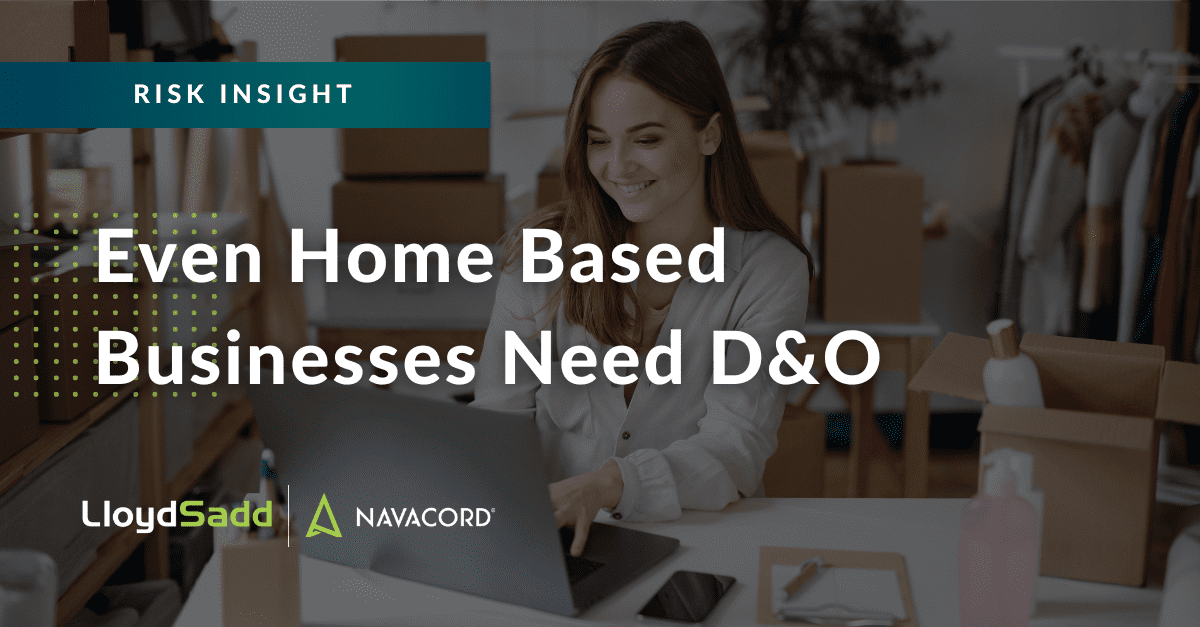Even Home Based Businesses Need D&O

Approximately 20% of Canadians work from home, according to Statistics Canada. While “home-based” businesses are primarily operated out of one’s home, business activities may take place at other locations. The most common home-based businesses are communication, IT, construction and professional services.
If you run your business from home, you may think directors and officers (D&O) insurance isn’t necessary. However, the size and location of your business aren’t what determines the need for protection or the amount of coverage you need. If you have employees, or work with vendors, companies or investors who could sue your leadership for failure to perform, you should discuss D&O coverage with your insurance broker.
This coverage can be crucial because your business and its individual leaders can be named in a lawsuit against the company. If those individuals don’t have D&O liability insurance, they will have to fund their own legal defense. And if the organization doesn’t have a D&O policy, the owners will have to use crucial business funds to defend the company.
Keep in mind that if you operate your business as a corporation, that doesn’t mean your personal assets are automatically protected. And even if you established your company as a sole proprietorship, you could still be sued by a client or customer.
What does D&O insurance cover?
Although the scope, industry and structure of your business may impact your policy options and premiums, a well-designed D&O policy will cover any legal expenses, damages or settlements against you if someone questions your professional judgment. It protects your organization’s leadership (and their spouses) from personal financial loss if they’re accused of failed or wrongful actions taken on behalf of the company, including breaches of duty, negligence and misrepresentations. These include leadership responsibilities related to:
- Management of corporate operations
- Strategic planning
- Use of company funds
- Appropriate and truthful reporting and payments (e.g., taxes and invoicing)
- Ethical hiring of competitors’ talent
- Oversight of data and other security concerns
- Regulatory compliance
D&O insurance does not cover fraud, criminal activities or losses connected to illegal profits. It also excludes losses related to bodily injuries, property damage and employee retirement funds.
How D&O differs from other insurance
You may think D&O insurance duplicates protection you already have under other policies. However, leadership risks are often excluded from other important insurance policies. While your insurance broker can explain the differences between your policies, the general differences and gaps in leadership protection are described below.
Home insurance
You may lead your business from a home office, but your homeowners insurance does not extend to company-related risks. Homeowners insurance normally excludes liability claims against any businesses owned or operated by you or another member of your household.
General liability
Although you should have a commercial or business general liability policy, you can’t count on it to cover allegations against your company’s leadership. While general liability insurance will kick in if one of your decisions causes bodily injury to another person or physical damage to their property, it normally excludes liability claims alleging wrongful acts or decisions related to business operations. Examples include mismanagement of funds, questionable business practices, conflicts of interest, and violations of contracts or agreements.
Professional liability
Even a professional liability (aka errors and omissions (E&O)) policy doesn’t serve as a substitute for D&O coverage. D&O shields you from different risks.
Professional liability protects business assets if your company or its employees are accused of failing to perform to an expected standard of care. For example, an IT consulting company might make a programming error that shuts down a client’s network, or a marketing firm might miss a crucial advertising deadline that leads to a loss of sales. Any claims or lawsuits related to these types of performance failures would be covered by a professional liability policy.
On the other hand, if a company is accused of poaching customers from a competitor in violation of a noncompete agreement or failing to disclose finances as part of an asset sale, its D&O policy would be triggered. That’s because these issues are more closely tied to leadership decisions.
Getting the right policy
Your insurance broker might recommend D&O insurance as part of a comprehensive business insurance plan that includes:
- Professional liability (described above)
- Business property (to cover physical equipment and office space)
- Cyber insurance
- Commercial auto (even if you use a personal vehicle for business)
- Fiduciary liability (which covers claims of employee benefit plan mismanagement)
- Employment practices liability (to protect against allegations of wrongful termination, discrimination, workplace harassment and retaliation)
D&O liability insurance may also be available on a stand-alone basis.
Ultimately, your recommended D&O coverage depends on your operations and who has a financial stake in your organization. Partnerships, nonprofits, private equity investments and other financial arrangements all impact your D&O needs. After a thorough review of your risks, your insurance partner will work with you to find the D&O policy that’s right for your home-based business.
To download the insight, click here: Risk_Insight_Even Home Based Businesses Need D&O